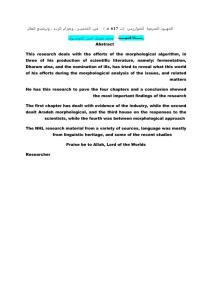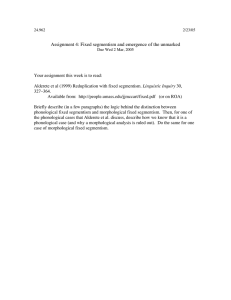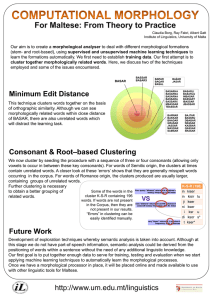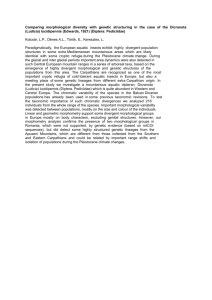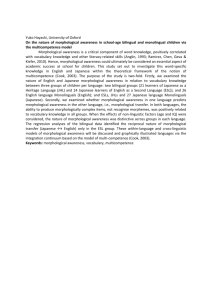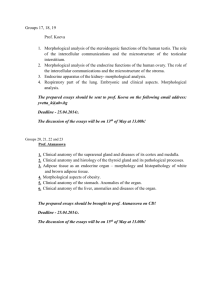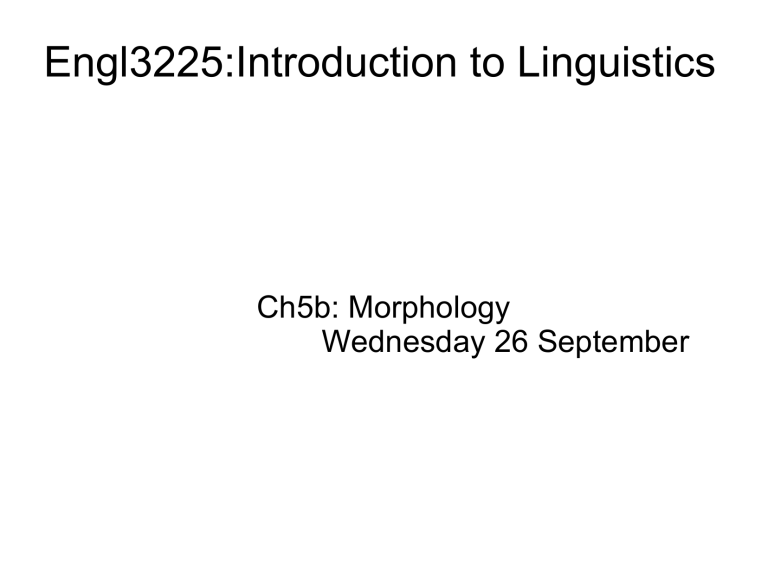
Engl3225:Introduction to Linguistics
Ch5b: Morphology
Wednesday 26 September
Last time...
●
●
●
“Morphology”
Free vs bound morphemes
Morphological processes
–
●
●
i.e. prefixation
Polysynthesis
(what’s a ‘word’?)
Today...
●
●
●
Morphological processes
Some parts of speech
Some morphological categories
Morphological Processes
• Affixation
–
–
–
–
Prefix
Suffix
Infix
Circumfix
• Reduplication (a
special kind of
affixation)
• Others?
Yes, but first
●
●
●
●
●
You need to know your parts of speech for
the worksheet for HW5 on webct
So, let’s be sure we’re on the same page
about these
We remember the parts of speech that form
the content words?
Nouns, verbs, adjectives, adverbs
What else do you need?
Some parts of speech
• You will find paintings of Joan Miro on my next
slide.
● (Pronoun)
● You will find paintings of Joan Miro on my next
slide.
● (Possessive pronoun)
● You will find paintings of Joan Miro on my next
slide.
● (Prepositions)
• Shannon will now show you the next slide
● (Proper noun)
Paintings of Joan Miro as promised
You’ll also need some morphological
categories
Nicole swims.
• ( -s, 3rd person singular subject, present tense)
● Nicole's mood is happiest when she is swimming
at one of the local pools.
• (-'s = possessive, -ing progressive, -s plural
● The water’s temperature must be at least 75% or
it is not swimmable.
• (-able = ‘ability, possibility’)
●
Back to Morphological Processes
●
●
You’ll need some more morphological processes;
not just affixation
Does anyone remember any from the readings???
Morphological Processes
●
Compounding (2 or more free morphemes combined
to form a word)
–
–
–
–
–
●
●
Black + board = blackboard / white + board = whiteboard
Blue + berry = blueberry
Bitter + sweet = bittersweet
Car + jack = carjack
Hog + wash = hogwash
(but be careful…)
Cranberry = cran+berry? Laughable = laugh + able?
Morphological Processes
●
●
●
●
●
●
Labrador x Poodle =?
(Labradoodle!)
Pug x Beagle = ?
(Puggle!)
So what’s a Saint
Berdoodle?
A Doodleman
Pinscher?
Morphological Processes
●
●
“Blends”
Old blends =
–
–
–
●
Smog
Motel
Brunch
New blends
Snivelization
– Blog
– Rageoholic
Spanish examples??
●
●
–
●
●
●
●
●
Alcohol + ic
Gets reanalyzed as
–
–
●
(Blend + reanalysis)
Alcoholic
Alc + oholic
Then –oholic gets
used as a suffix!
Choc-oholic
Blend-oholic
Spanish examples?
Something to note
●
●
●
●
The morphological processes so far all
have something in common…
You take a couple of morphemes, and you
‘concatenate’ them (i.e. you string them
together in a row)
These are called ‘concatenative
morphological processes’
Not all morphological processes are
concatenative, though…
Morphological Processes
●
Morpheme-internal change
–
–
–
–
–
●
Goose (sg) vs geese (pl) *gooses
Woman (sg) vs women (pl) *womans
Ring (present) vs rang (past) *ringed
Swim (present) vs swum (present perfect) vs swam
(different past)
Steal (present) vs stolen (present perfect) vs stole
Null-derivation
–
–
–
‘I run daily’ vs. ‘Today’s run was hard’
Sheep (sg) vs sheep (pl)
Mop (n) vs mop (v)
Morphological Processes
●
Suppletion
–
–
–
●
‘be’ ‘am’, ‘were’, ‘was’ (*I be, he/she/it bes)
Person/people, (?persons)
Bad/worse (*badder)
Back-formation
–
–
–
–
–
–
Orientate, conversate
(orient/orientation; converse/conversation)
Stoke, swindle, burgle, edit
(stoker, swindler, burglar, editor)
Pea
(pease)
Morphological Processes
●
●
●
Truncation
Nicknaming, i.e. Christopher Chris, or Toph, or
Topher
Some varieties of informal usage “Hello,
Ancient Relly!”
–
●
●
Life can be delish/ When you have a sunny disposish!
Other random truncations - “half-caff”, “diffy-qs”,
“libes”
Productive truncation
–
–
hikck ‘cutting’ vs. hikc ‘cut’
cipkan ‘working’ vs. cipk ‘work’
Productive?
• Some morphological processes may be used
productively in a grammar.
• Productive processes are:
– Applied to new and made up words
– Applied to a majority of existing candidate words
– Acquired by children as a rule (goose geese
gooses/geeses geese)
• The opposite of ‘productive’ is ‘exceptional’ or
‘irregular’
– (all languages have both kinds of processes!)
– Suppletion is, by defintion, an irregular process
Morphological Categories
●
●
●
What do these processes do? How can
morphological processes be used to build
word meanings?
There are certain types of meanings that
are crosslinguistically encoded by
morphological processes.
We’ll call these our morphological
categories.
Morphological Categories
• Tense {past, present, future}
–
●
I laughed, I laugh, I will laugh
Some languages use only 2 tenses
–
–
{past, non-past}
{present, non-present}
• Aspect {perfective, imperfective}
– I laugh, I am laughing
● Perfective – an action happens once, and is over
● Imperfective – an action happens in an ongoing
manner (progressive is a type of imperfective
aspect)
Morphological Categories
• Person {1st, 2nd, 3rd}
● I, me, my, mine, we, us, our, ours
● You, your, yours
● He, she, it, him, her, his, hers, they, them,
theirs
• Number {singular, plural, dual, paucal,
distributive}
● Dog, dogs
Next time...
●
●
HW: go to webct, print and do homework 5.
Bring it to class complete on Monday.
RD: the remainder of chapter 5
